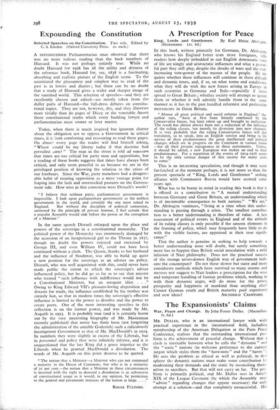A Prescription for Peace
King, Lords and Gentlemen. By Karl Heinz Abshagen. (Heinemann. 12s. 6d.) King, Lords and Gentlemen. By Karl Heinz Abshagen. (Heinemann. 12s. 6d.) IN this book, written primarily for Germans, Dr. Abshagen, who knows his England better than most foreigners, tells readers how deeply imbedded in our English democratic ways of life are kingly and aristocratic influences and what a power- ful part they still play, despite the shocks of wars and the ever increasing vote-power of the masses of the people. He in-
quires whether these influences will continue in these difficult and dynamic times, and, if so, on what terms and conditions; what they will do with the new forces arising in Europe in
such countries as Germany and Italy—especially if these spread to Great Britain ; whether society will attempt to ignore them or whether it will adroitly handle them in the same manner as it has in the past handled reformist and proletarian
movements in Great Britain.
" Almost all great political and social reforms in England," the author says, " have at first been bitterly combated by the Conservative forces, but later taken up and brought to realisation. The result has almost always been not a reduction of the influence of the ruling classes, but merely its diversion into new channels. It is very probable that the ruling Conservative forces will also transform, so to speak, into an English version and bring to the service of their predominance the great intellectual and political changes which are in progress on the Continent in various forms —for all their present repugnance to these movements. Unless, it should be added, a new European war makes an end to their predominance. For a repetition of the events of 1914-1918 seems to be the only serious danger of this society for many years to come."
This is an interesting speculation, and though it may seem
far-fetched at the moment perhaps, it is not more so than the present spectacle of " King, Lords and Gentlemen " seeking alliance with Communist Russia would have seemed some years ago.
What has to be borne in mind in reading this book is that it is offered as a contribution to " A mutual understanding between Germany and Great Britain, an understanding which is of inestimable consequence to both nations." " We are," Dr. Abshagen continues, " living at a time when this under- standing is passing through a crisis. The smallest contribu- tion to a better understanding is therefore of value. A just assessment of political events in England and of the attitude
of its ruling classes is only possible if the unseen elements in the framing of policy, which may frequently have little to do with the visible factors, are appraised at their true signifi- cance."
That the author is genuine in seeking to help towards a better understanding none will doubt, but surely something more has to happen than British social inoculation with a mild infusion of Nazi philosophy. Does not the practical success of the strange aristo-demos English way of government indi- cate the counterpart? Do not these slower but surer and more considerate methods which have survived so many storms and stresses not suggest to Nazi leaders a prescription for the wise and temperate handling of human problems which, working in with their dynamic urges, will do more for the peace, prosperity and happiness of mankind than anything else? Cannot German youth and British maturity pool experience








































 Previous page
Previous page